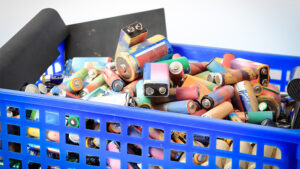 Senator Derek Stanford (D-1-Bothell) intends to re-introduce a form of House Bill 1896. The bill was previously prime sponsored by Rep. Harris-Talley and heard during the 2022 Legislative Session but failed to pass.
Senator Derek Stanford (D-1-Bothell) intends to re-introduce a form of House Bill 1896. The bill was previously prime sponsored by Rep. Harris-Talley and heard during the 2022 Legislative Session but failed to pass.
The State of California recently adopted two new battery-related laws, with one targeted at batteries and the other on products with batteries embedded. The bill Stanford is considering at this time would contain both. His bill seeks to establish a producer responsibility stewardship program administered by the Department of Ecology to ensure batteries are properly disposed of or recycled.
Washington Retail has many members that sell batteries, items that contain batteries, or both, so this is of great interest to them, and they want it to be done right. From WR’s perspective, several key points must be included in the final proposed bill. First, a retailer taking back end-of-life batteries should be voluntary. With 938 battery collection sites already in place throughout Washington, we don’t see a need to force retailers’ stores to serve as collection points. Second, the program’s cost should be borne by the manufacturers of the batteries, not by retailers and their customers. Third, the program’s cost should be embedded in the cost of the batteries or battery-containing devices. The cost should not be in a tax or fee at the point of sale. Fourth, warnings should be issued first for inadvertent mistakes before a fine is levied. And fifth, the definition of “producer” must be written to ensure retailers aren’t left holding the costs for store-branded items.
Retailers care about the environment for their customers, employees, themselves, and their families. Many retailers have already voluntarily adopted battery recycling programs at their own cost to benefit the environment and bring customers into their stores.
WR looks forward to working with Senator Stanford, a potential House sponsor, and concerned stakeholders to create an effective, convenient, and cost-efficient program. Examples of well-run programs are the E-waste program and the unused drug disposal program.
If you are interested in joining the discussion about batteries, please let us know, and we will connect you to the stakeholder group.





